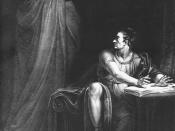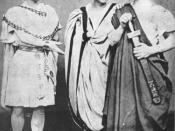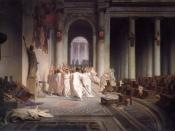"Et tu Brute?" was mumbled by Caesar previous to his death. In William Shakespeare's play, Julius Caesar, Marcus Brutus was a tragic hero, regardless of his crucial act of betrayal. Brutus was considered no threat, and was a clever man because of his nobility. What lead the downfall of the play were his honor, idealism, and poor judgment.
Honor is a fundamental basis of Brutus, and is evidently worked out in his speeches throughout the play. "Who here is so rude that would not be a Roman? If any, speak, for him have I offended," was asked by Brutus, as he spoke to the plebeians at Caesar's funeral. That question proved that he was honorable, and cared for the happiness of the plebeians, and cared for Rome, however, he looses his common sense, and lets honor get in the way of his friendship with Caesar. Lastly, Brutus tries to show his nobleness to nearly everybody.
Brutus judges his honor in all ways, and his option of life revolves around honor. For that reason, many people, friend or foe, was conscious of his honor. At Phillipi, Antony discovers Brutus' dead body, and stated, "This was the noblest Roman of them all. All the conspirators save only he did that they did in envy of great Caesar." Here, Antony separates Brutus from the rest, indicating that Brutus would only do such a thing for the good of Rome, whereas the conspirators could not compete to Brutus' high standards.
Secondly, Brutus was extremely idealistic, and had an inexperienced personality which was formed by nobility, and loyalty. Idealism leads Brutus to think that everything people tell him is true. Brutus gets stubborn when people try to get in the way of his plans, or beliefs. Cassius decided to kill Antony because of...


